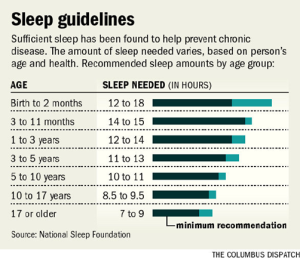
08 Mar How Much Sleep is Normal ?
Seven and up: Optimize your health with 7 hours of sleep or more each night!
Perhaps the number one question asked of the sleep medicine community is: “How much sleep do I really need?” The answer has always been complicated and dependent on which aspects of human health and physiology are considered. Genetic factors, environmental influences, and individual susceptibility to the effects of sleep curtailment all play a role in determining the answer.
In 2013, the American Academy of Sleep Medicine, in partnership with the Sleep Research Society and other organizations, established a five year cooperative agreement with the Centres for Disease Control and Prevention called the National Healthy Sleep Awareness Project (NHSAP). NHSAP focused on four sleep health goals as delineated in Healthy People 2020, one of which is to increase the proportion of adults who get sufficient sleep from a baseline of 69.6% to 70.8%.
In the course of building strategies to accomplish this goal, project members realized ‘sufficient sleep’ is not consistently defined so a consensus conference was conceived to determine sufficient sleep for a healthy adult.
The consensus conference followed a modified RAND Appropriateness Method to achieve its goal. The first step was performing a comprehensive literature search to assess all relevant studies for inclusion in evidence tables. Because the three key components to healthy sleep are adequate duration, appropriate timing, and the absence of sleep disorders, there needs to be exclusion of sleep duration in shift work, sleep disorders or other illnesses, and studies assessing treatment effects (e.g., pharmacological, behavioural) on sleep length.
The modified RAND Appropriateness Method focused on various ‘indications’, which are questions regarding the amount of sleep considered sufficient to support optimal health. As such, eight health domains have been defined to categorize the literature and facilitate the process, these include: functional, cardiovascular, metabolic, immune, mental health, pain, cancer, and longevity.
Members performed this assessment over the course of 2015, and recently agreed on the following statement:
“Adults should sleep 7 or more hours per night on a regular basis to promote optimal health”
Research provided strong evidence we are harming our health by restricting our sleep. Getting less than 7 hours of sleep on a regular basis increases our risk of several adverse health outcomes:
- weight gain and obesity
- diabetes
- high blood pressure
- heart disease
- stroke
- depression
- impaired immune system
- increased risk of death
Sleeping less than 7 hours per night also can impair our performance. We have an increased risk of errors and accidents when we don’t get enough sleep each night.
Exactly how much sleep is right?
It may be more than 7 hours. Some adults may need a longer sleep duration of more than 9 hours per night. Long sleepers may include young adults and those who have a chronic illness. A small percentage of adults are short sleepers who feel alert and refreshed after sleeping less than 6 hours per night. Genetic factors help determine how much sleep you need.
But 7 hours of sleep is the best starting point for adults. Make it one of your patients, and your own top health priorities to sleep at least 7 hours each night. Keep in mind that healthy sleep requires good quality and regularity.
This final recommendation by NHSAP stakeholders, including the American Academy of Sleep Medicine, Sleep Research Society, and Centres for Disease Control and Prevention hopes the consensus recommendation provides a coalescing framework for future investigations assessing the impact of sleep duration on human health.
Reference: 1. Watson NF. Sleep duration: a consensus conference. SLEEP 2015;38(1):5.


